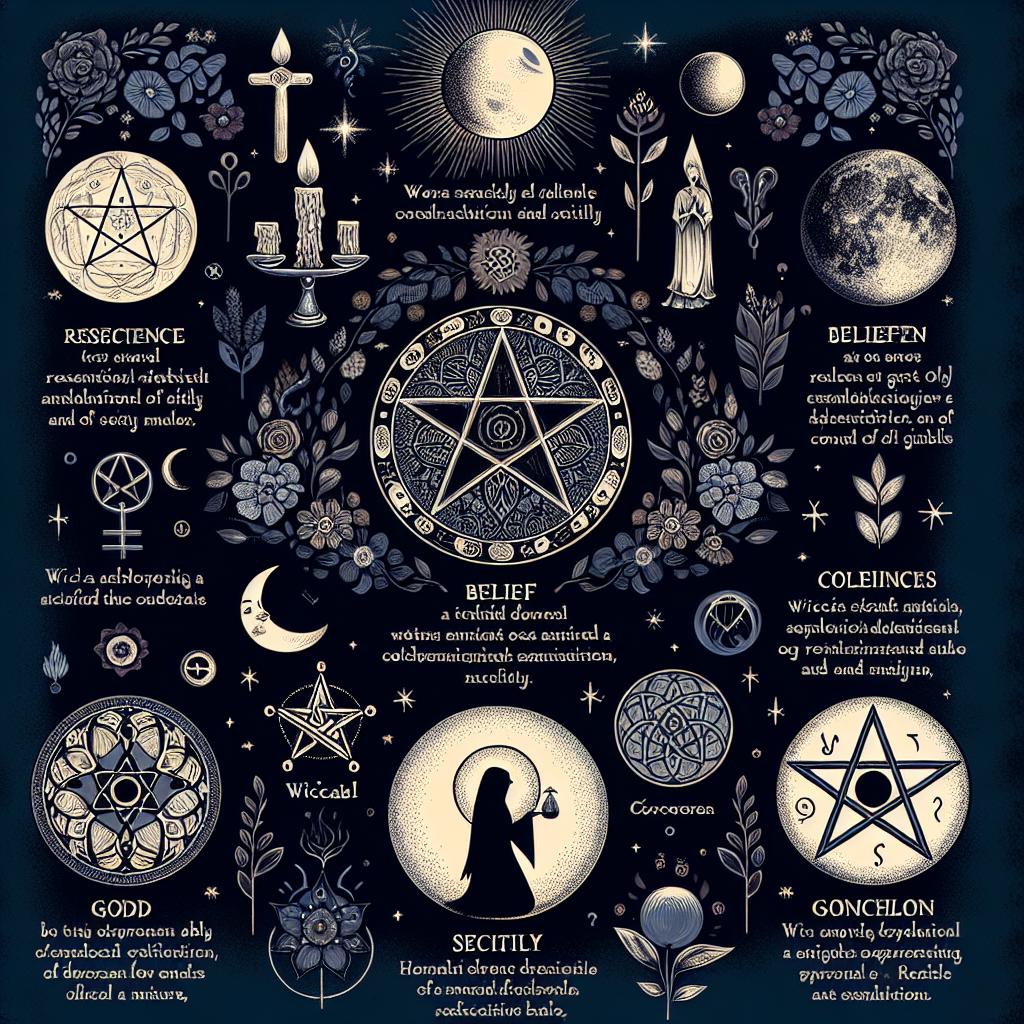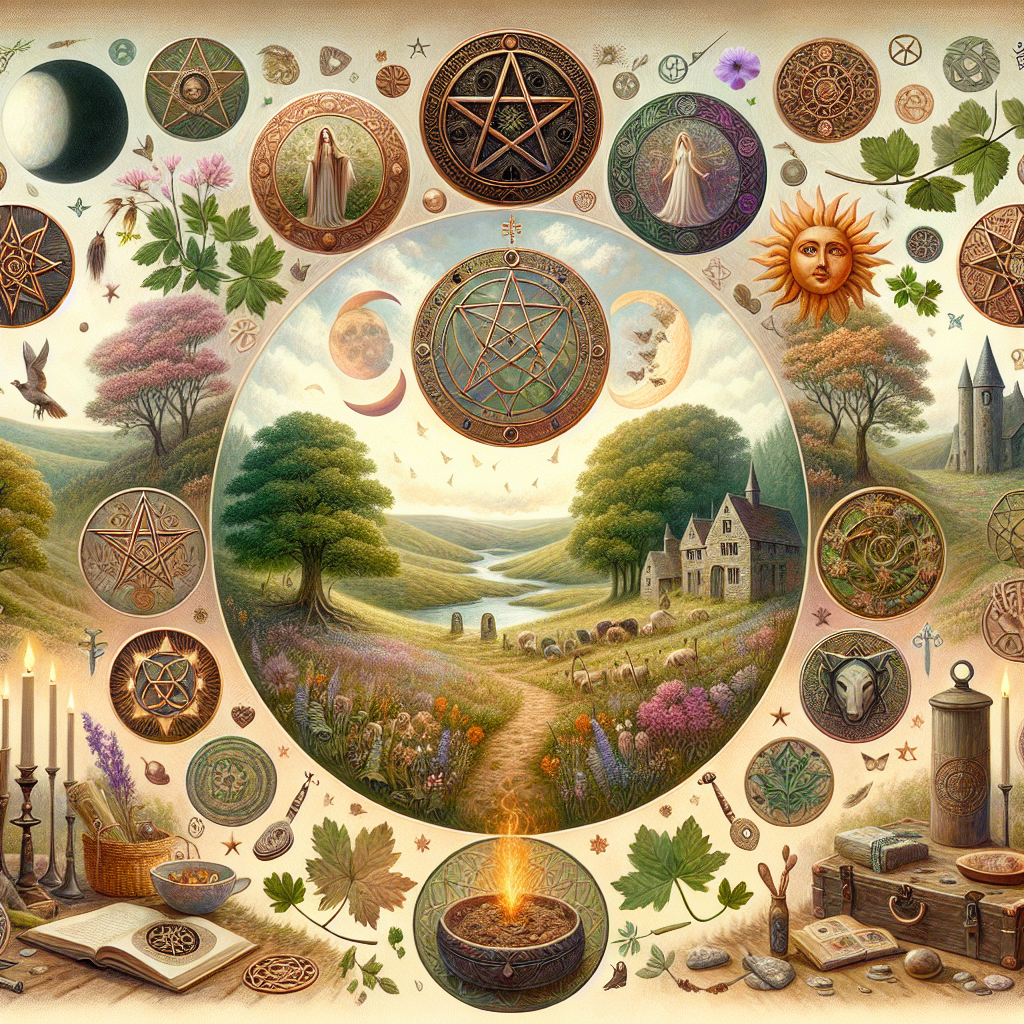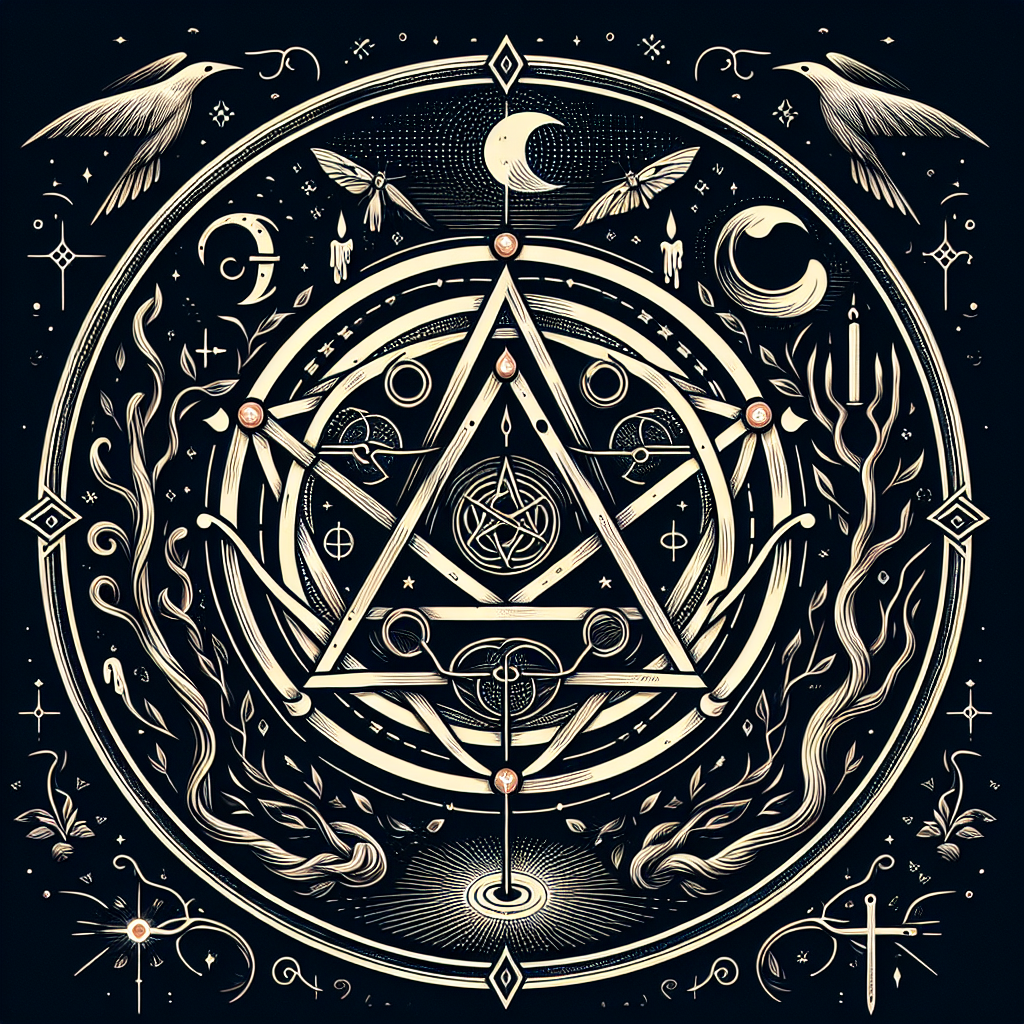As an Amazon Associate I earn from qualifying purchases.

Originating in the mid-20th century, Wicca is a modern Pagan religion with a focus on the worship of nature and a duotheistic belief system honoring both a God and a Goddess. Often described as a nature religion, Wiccans celebrate the cycles of the moon and seasons as manifestations of the divine.
The roots of Wicca can be traced to England during the 1940s, when Gerald Gardner introduced it as a new religious movement. It draws upon various older pagan traditions and esoteric schools of thought, blended with ceremonial magic and folkloric practices. Over the years, Wicca has diversified into a wide range of traditions or ‘paths,’ each with its own unique practices, but most share core beliefs and rituals.
A defining tenant of Wicca is the “Wiccan Rede,” a statement that advises practitioners to “An it harm none, do what ye will.” This ethic of non-harm underpins much of Wiccan moral philosophy. The threefold law, another important concept, teaches that whatever energy a person puts out into the world, be it positive or negative, will be returned threefold.
Wicca is known for its ritualistic practices, often involving the casting of a circle to create sacred space, the invocation of deities, and the celebration of Sabbats and Esbats, which mark the Wheel of the Year. Sabbats correspond to seasonal festivals such as the solstices and equinoxes, whereas Esbats are celebrations of the lunar cycle.
As of the early 21st century, the Pew Research Center estimated that approximately 0.4% of Americans identify as Wiccan or Pagan, signifying a growing interest in nature-based spirituality. This statistic underscores the increasing visibility and influence of Wicca in contemporary religious discourse, as it offers spiritual paths that emphasize personal experience and harmony with the natural world.
Diverging from more dogmatic or scripture-based religions, Wicca often emphasizes personal spiritual growth and the quest for knowledge. Many Wiccans practice solitary or in small groups known as covens. However, despite its individualistic nature, the sense of community and shared reverence for life is palpable in public gatherings and celebrations within the Wiccan community.
“`html
What Are the Fundamental Beliefs and Practices of Wicca? An Overview
“`
Wicca is a modern, nature-based pagan religion that celebrates the cycles of the earth and the divine in various forms. It is characterized by its reverence for the God and Goddess, the practice of magic, and the observance of seasonal festivals known as Sabbats. Wiccans abide by the Wiccan Rede, “An it harm none, do what ye will,” which promotes freedom while emphasizing the moral responsibility not to harm others. Rituals often involve casting a circle, using elements like fire and water, and may include spellwork aimed at personal growth, healing, or positive change. Each Wiccan’s practice is unique, with solitary practitioners and various traditions adding to the rich tapestry of Wiccan belief. Continue reading to dive deeper into the enchanting world of Wiccan tenets and the intricacies of their nature-centric worship.
Wicca is a modern pagan, witchcraft religion that emerged in the mid-20th century, attributed to the works and teachings of Gerald Gardner. It draws upon a diverse set of ancient pagan and 20th-century hermetic motifs for its theological structure and ritual practice. Wicca is deeply rooted in the reverence of nature and promotes the understanding and balance of natural forces. Followers of Wicca, known as Wiccans, celebrate the Earth and its cycles through festivals, rituals, and spells.
**Central Beliefs and Deities**
Wiccans worship a duotheistic system, honoring both a God and a Goddess, who are seen as equal and complementary counterparts representing the male and female energies of the universe. These deities are often identified as the Moon Goddess and the Horned God, although many Wiccans see them as facets of a greater pantheistic spirit. The exact names and personas of these deities can vary among different Wiccan traditions.
**The Wiccan Rede and the Threefold Law**
The Wiccan Rede is a fundamental ethical guideline which states, “An it harm none, do what ye will,” emphasizing personal freedom and responsibility. Alongside the Rede, Wicca teaches the Threefold Law, or the Rule of Three, which suggests that whatever energy a person puts into the world, whether positive or negative, will be returned to them three times.
**Rituals and Practices**
Wiccan rituals often revolve around the Wheel of the Year, which is composed of eight festivals known as Sabbats. These include four solar holidays—the two solstices and two equinoxes—and the four midpoint festivals: Samhain, Imbolc, Beltane, and Lughnasadh. Also, Wiccans observe esbats, which are rituals that honor the lunar cycle, particularly the full and new moons.
**Magic and Spellcasting**
One of the key components of the Wiccan faith is the practice of magick (often spelled with a ‘k’ to distinguish it from stage magic). Magic in Wicca is considered a natural, not supernatural, practice that can influence the physical world. Wiccan spells are typically performed within a sacred circle and use a variety of tools, such as wands, athames (ritual knives), chalices, and pentacles. These spells are intended to serve for positive goals, such as healing, protection, and love.
**Nature and the Elements**
Wicca places a heavy emphasis on nature and sees the divine as manifesting through the Earth and the natural world. Wiccans may worship and conduct rituals in natural settings and often use natural objects like stones, crystals, herbs, and feathers in their practices. The religion also recognizes the four classical elements—earth, air, fire, water—and sometimes spirit as a fifth, which are thought to represent different kinds of energy and are integral to many rituals.
**Ethics and Personal Responsibility**
Personal responsibility is paramount in Wicca. Wiccans are encouraged to develop their understanding and philosophy of life through study, observation, and their interactions with the world around them. Unlike many religions with a hierarchal clergy, Wicca tends to emphasize personal spiritual growth and self-discovery.
**Community and Traditions**
There are many different traditions within Wicca, each with its own specific set of practices, deities, and worldviews. Some of the most well-known traditions include Gardnerian, Alexandrian, and Dianic Wicca. While some Wiccans practice within covens, others follow a solitary path.
Despite its relatively recent origins, Wicca has spread rapidly and has an estimated 1.5 million followers worldwide, making it one of the fastest-growing religions. As a spiritual path, it continues to evolve, drawing new adherents and diversifying its practices while retaining its core principles of respect for nature, belief in the power of magic, and celebration of the divine in all its forms.
1. What is Wicca and is it the same as Witchcraft?
A: Wicca is a modern, nature-based pagan religion that has its roots in ancient pre-Christian religious traditions. It is not synonymous with witchcraft, although witchcraft—or the practice of magick—is often part of Wiccan practice. Wicca, however, encompasses a wide range of beliefs and practices including ritual, ethical guidelines, and seasonal festivals.
2. When was the Wicca religion founded?
A: Wicca, as a distinct religious movement, was founded in the first half of the 20th century. It’s often attributed to Gerald Gardner, who popularized the religion in the 1950s with his writings and establishment of the first Wiccan coven in the modern era.
3. Are there gods and goddesses in Wicca?
A: Yes, the majority of Wiccans believe in a form of duotheism that includes a God and a Goddess. These deities are often seen as equal, complementary forces, and may be represented in many forms drawn from different mythologies. Some Wiccans may focus on a specific pantheon or set of deities from ancient cultures.
4. What are some of the central beliefs of Wicca?
A: Central beliefs in Wicca include the reverence for nature, belief in the power of magick, and the law of threefold return, which states that whatever energy a person puts into the world—positive or negative—will be returned to them three times. Wiccans also celebrate the Wheel of the Year, which includes eight Sabbats, or holidays, that follow the seasonal cycles of nature.
5. What does the Wiccan Rede mean?
A: The Wiccan Rede is an ethical guideline that states “An it harm none, do what ye will.” It suggests that Wiccans are free to do as they please, as long as their actions do not harm themselves or others, including nature.
6. How do Wiccans practice their religion?
A: Wiccans practice their religion through rituals and ceremonies that often involve casting a circle, calling the quarters or directions, invoking deities, and performing magickal workings. Celebrating the cycles of the moon (esbats) and the Wheel of the Year (Sabbats) are also central to Wiccan practice. Many Wiccans practice alone as solitaries, while others join covens or groups.
7. Is there a holy book in Wicca?
A: There is no single holy book universally recognized in Wicca. Instead, Wiccans may draw on a variety of texts for inspiration, including “The Book of Shadows,” which is a personal or coven record of rituals, spells, and magickal practices.
8. Can anyone become a Wiccan?
A: Yes, Wicca is an open religion, and anyone can become a Wiccan. It does not require one to be born into it or to have any specific background. Learning about the religion, participating in its practices, and adhering to its beliefs and ethical guidelines are the key steps to becoming a Wiccan.
9. Do Wiccans have regular places of worship?
A: Wiccans do not typically have established places of worship like churches or temples. Many practice outdoors in nature or in private homes. Some practitioners may set up altars in their homes where they can conduct rituals and worship privately or with others.
10. Is Wicca recognized as a legitimate religion?
A: Yes, Wicca is recognized as a legitimate religion in many countries around the world, including the United States, where it has been granted the same rights and protections as other religions under the law.

Conclusion
The Wicca religion, rooted in ancient pagan beliefs and modern witchcraft, upholds a diverse yet interconnected set of tenets and practices that are both personal and universal among its adherents. Central to Wiccan beliefs is the worship of the dual deities, the Goddess and the God, representing the balance of energies in nature and humanity. Wiccans honor these deities through seasonal festivals, known as Sabbats, and lunar celebrations, called Esbats, which together constitute the Wheel of the Year. Ethics in Wicca are guided by the Wiccan Rede, “An it harm none, do what ye will,” emphasizing personal responsibility and harmlessness. Additionally, the Threefold Law cautions that energy sent out into the world, whether good or bad, will return threefold, thus encouraging positive actions and thoughts.
Practices within Wicca are as varied as its practitioners, with rituals often incorporating elements like casting circles for protection, invoking deities, and harnessing natural energies. These rituals can be solitary or communal, highlighting the adaptability and personal nature of the religion. Magick in Wicca is another crucial aspect, used for healing, protection, and personal growth, rather than for harm or coercion. Tools such as athames, wands, pentacles, and cauldrons serve as aids in focusing intent and energy. Ultimately, Wicca empowers individuals to forge deeply personal spiritual paths while fostering a respect for life, nature, and the interconnectedness of all things.
Amazon and the Amazon logo are trademarks of Amazon.com, Inc, or its affiliates.


